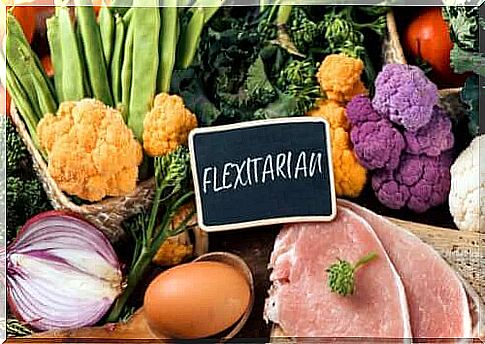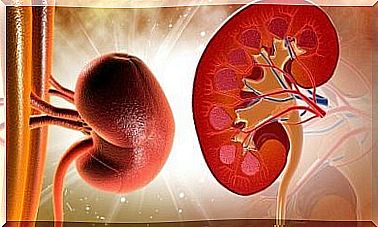Flexitarianism: Definition And Benefits
Flexitarianism is the term to describe people who mainly consume plants, but occasionally eat meat. Here are its benefits.

Have you ever heard of flexitarianism? As vegetarian and vegan lifestyles have taken hold in our society, there is a growing group of people who can be considered flexitarians. Do you know what this means? What are the benefits of this food model?
This term is quite recent. More concretely, flexitarianism refers to the flexibility of the diet. So you are probably part of this group of people without knowing it. Find out more in this article.
What is flexitarianism?
We call flexitarians all individuals who base their eating habits on a vegetarian diet, but who sometimes consume meat. This means that they also eat fish, seafood and poultry.
Since vegetarianism is on the rise, some of these people are starting this lifestyle with flexitarianism. Thus, they gradually leave aside the ingestion of meat until it is completely limited in the future.
On the other hand, this group can also include individuals who are not meat lovers but who decide to ingest it on special occasions. Or those for example who consume fish and seafood, but not beef.
To be clear, this is not a subset of the vegetarian diet. These people have good ethical reasons for not eating animal meat in these particular circumstances. However, for flexitarians, consuming meat does not constitute a transgression of their lifestyle. So it doesn’t come with a feeling of guilt.

What are the benefits of flexitarianism?
Various studies have suggested that basing the diet on vegetables has health benefits. Considering of course that the diet is balanced in nutrients and adapts to each individual. Likewise, these effects appear when the consumption of processed, fried products and harmful substances such as alcohol and tobacco is limited.
In this article, we detail the positive impact of flexitarianism in the body.
It prevents the onset of cardiovascular disease
The cardiovascular diseases represent a public health problem and serious world. They are also the main cause of death in industrialized countries. On the other hand, they are caused by the accumulation of saturated fat and cholesterol in the arteries. Nutrients that are abundant in red meat and meat products.
In this sense, evidence suggests that a plant-based dietary model, such as flexitarianism, is positive in preventing noncommunicable diseases. The benefits are present, not only through the decrease in harmful fats, but also because antioxidants and anti-inflammatory compounds capable of improving vascular health predominate.
Flexitarianism fights obesity and diabetes
Obesity and type 2 diabetes are pathologies of metabolic origin which have an inadequate diet as a risk factor. According to the data expressed in the article “Flexitarianism: a review of the literature”, this eating mode is linked to a lower risk of suffering from these diseases.
Indeed, this study reveals that the body mass index (BMI) is within the normal parameters in vegetarians and flexitarians, compared to omnivorous individuals. An adequate BMI is a protective factor in the face of chronic pathologies of vital organs.
This diet prevents the appearance of intestinal pathologies
The Crohn’s disease and colorectal cancer are associated with excessive intake of red meat, sausage and fat products. Therefore, this type of diet has a preventive action against these diseases.
Likewise, the consumption of natural foods also maintains healthy digestive tract structures as well as the balance of the microbiota. This reduces the appearance of intestinal candidiasis and the formation of diverticula. These are pockets or dilations that form in the intestinal wall and can become inflamed.
Flexitarianism prevents kidney and gallstones
In general, the excessive consumption of proteins, in particular animal proteins, induces the elimination of calcium, uric and oxalic acid through the urine. These substances are the basic components in the appearance of kidney stones.
On the other hand, they are linked to the regular intake of cholesterol and unhealthy fats, typical of meat-based diets. In this regard, kidney health can be protected by reducing the consumption of these foods.

Flexitarianism: what to remember …
As you can see, flexitarianism offers various health benefits. As it is based on the ingestion of plants, the intake of dietary fibers, anti-inflammatory and antioxidant substances, is high. This then avoids the typical diseases associated with the Western diet.
Nevertheless, it should be emphasized that, like any diet, it must be balanced in nutrients and adapted to each individual. Finally, if you want to start this type of diet, you are strongly advised to consult a nutritionist for information on this subject.









